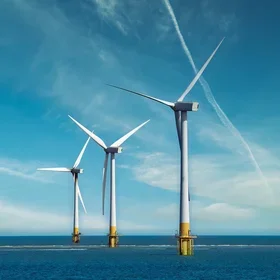By Steven Cohen, Ph.D., Director of the M.S. in Sustainability Management program, School of Professional Studies
Fossil fuels will be burned for another generation, and then they will be replaced by renewable energy. The technology of converting solar radiation to electricity, either directly or through wind or geothermal power, is getting better and cheaper. The technology of battery storage is also improving, so the issue of intermittency will eventually fade away. Fossil fuels are finite, geologic resources, and someday people will be amazed that we burned these critical resources that are far more valuable as petrochemicals than as sources of energy. But don’t tell any of that to President Trump or other advocates of “drill baby drill.” These folks are aggressively moving against government subsidies designed to accelerate decarbonization, even though most of these subsidies are going to people and businesses in the states that supported Donald Trump for president. The Wall Street Journal’s Kimberley A. Strassel believes that policies designed to reduce greenhouse gases are the result of “climate hysteria” and that: “The rollback is instead an admission that this federal gusher of subsidies is highly distortionary to markets, has hiked prices, and is standing in the way of Donald Trump’s more broad-based energy agenda.”
Strassel conveniently forgets long-standing fossil fuel subsidies, such as the oil depletion allowance and a range of other policies that have long promoted fossil fuels. It’s a little like the argument that Henry Ford’s Model T was a private sector innovation that revolutionized transportation, while forgetting that the public sector built all the roads that made the motor vehicle attractive to consumers. I agree with Strassel that banning the internal combustion engine is a bad idea. We didn’t need to ban VCRs to eliminate them; DVDs and streaming video did the trick. EVs will eventually displace internal combustion engine vehicles, and a price subsidy is a better idea than regulatory overreach. The same is true with renewable energy.
Let’s look at the business models of fossil fuels and solar power. Fossil fuels must be mined from the planet, transported, and then burned. Each step costs money and damages the environment. Fossil fuels are finite and have competing uses other than energy. As they become more difficult to remove from the planet, even with new technologies, they will eventually get more expensive. Solar power, in contrast, is virtually infinite or at least will outlast our species. It is also free. The technology to convert it to energy and to store that energy is rapidly advancing and getting less expensive and more reliable. A public-private partnership, like the one that enabled the Model-T, can accelerate the development of a new form of less expensive, decentralized, and more reliable energy. China and Europe understand all of this, and that is why American oil companies are not interested in “drill baby drill.” More supply without more demand will lower prices. Renewable energy is competing with fossil fuels and reducing some of the demand for these fuels. Renewable energy is the future, and fossil fuel-based energy is dying a slow death.
What Strassel termed Trump’s “broad-based energy agenda” is, in reality, an attack on policies that promote renewable energy. There is nothing broad about this agenda; it is a narrow and outdated fossil-fuel-first energy policy. Like the attack on university-based science, it is a policy that undermines American technological dominance and the real base of the American economy. Setting aside the issue of climate change, our energy grid is old and vulnerable, and new forms of energy generation and distribution are essential for an economy that is increasingly reliant on the use of energy. This transition will largely be funded via our monthly energy bills, but public investment can accelerate the process and ease the consumer’s cost of the transition to a modern energy system.
The Trump administration considers climate change a hoax and is eager to end Biden-era renewable energy subsidies. According to Brad Plumer and Harry Stevens of the New York Times:
“Over the past three years, companies have made plans to invest more than $843 billion across the United States in projects aimed at reducing planet-warming emissions, driven by lucrative tax credits for clean energy provided by the 2022 Inflation Reduction Act. But only about $321 billion of that money has actually been spent, with many projects still on the drawing board, according to data made public on Tuesday by the Clean Investment Monitor, a joint project of the Rhodium Group and the Massachusetts Institute of Technology. Now, much of the rest, about $522 billion, will depend on action playing out on Capitol Hill. Starting on Tuesday, Republicans in Congress will begin a contentious debate over proposals to roll back tax credits for low-carbon energy as they search for ways to pay for a roughly $4 trillion tax cut package favored by President Trump… A draft bill issued on Monday by Republicans on the House Ways and Means Committee would effectively end most of the Inflation Reduction Act’s tax incentives. A tax credit for low-carbon electricity sources like wind, solar, nuclear or geothermal power would be phased out over the next few years. Rebates for consumers to buy electric vehicles would mostly disappear by the end of 2025. Tax breaks for domestic factories that make batteries or solar panels would end by 2031 and would contain new restrictions that could make them extremely difficult to access. Incentives for producing hydrogen fuels would end this year.”
I know that some climate policy advocates get carried away, but the Inflation Reduction Act’s policies do not reflect climate hysteria. They are a reasonable effort to accelerate the development of technologies that will grow our economy while reducing pollution. The amount of private capital generated by these public subsidies is an indication that businesses understand the long-term value proposition of renewable energy, advanced battery technology, and electric vehicles.
The Trump administration’s attack on renewable energy, electric vehicles, science, and global trade is seriously undermining the American economy. It is an economic policy based on fantasy and free of facts. First, America, as the wealthiest nation in the world, benefits from the global economy. Some Americans are harmed, and we need policies to combat that harm, but overall, we benefit from this economy. Yes, there are national security issues that require domestic manufacturing, but tariffs are too blunt an instrument to stimulate those industries. Second, our medical and other scientific research has long stimulated technological and economic innovation, and our brain-based economy puts us in a commanding position in the world economy. Finally, renewable energy and energy efficiency will enable us to lower the costs and increase the reliability of our energy system. In the short term, reducing greenhouse gases will come at the expense of increasing toxic pollution due to the mining of rare earth minerals and the toxicity of some renewable energy technologies. But these are technological problems that can be addressed. At one point, laptop computers were mini-toxic waste sites. Ten years of innovation and invention have dramatically reduced the use of toxics in laptops. That will happen with batteries and solar cells.
We are experiencing national policy making that, unchecked, will impair America’s economy and way of life. Fortunately, we are seeing pushback, as state, local, and corporate investments continue to build the green economy. Projects subsidized by the federal government are being stalled or ended. But many other projects continue to hum quietly in the background. Environmental risks and the risks due to extreme weather events are growing. Most corporate leaders understand the need to mitigate and adapt to climate change. These are the objective conditions in which their businesses operate. Even the fossil fuel companies understand the promise and competition provided by renewable energy. The ideologues in the White House and their political allies are the only folks clinging to climate denial and fossil fuel fantasies. They may delay, but they will not deter the movement to decarbonize the world’s energy systems.
Views and opinions expressed here are those of the authors, and do not necessarily reflect the official position of Columbia School of Professional Studies or Columbia University.
About the Program
The Columbia University M.S. in Sustainability Management program offered by the School of Professional Studies in partnership with the Climate School provides students cutting-edge policy and management tools they can use to help public and private organizations and governments address environmental impacts and risks, pollution control, and remediation to achieve sustainability. The program is customized for working professionals and is offered as both a full- and part-time course of study.



